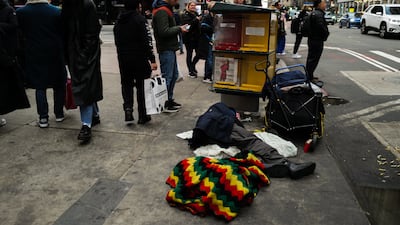Cities across the US have begun outlawing sleeping on the streets amid growing complaints from residents, as homelessness levels in the country reach new highs.
A report from the Department of Housing and Urban Development released last week showed homelessness in the US had risen 18 per cent over the past year. The results of a survey conducted on a single night in January 2024 found that there were more than 770,000 people either sleeping in shelters, in temporary accommodation or on the streets.
This was the highest level recorded since the federal government started collecting figures in 2007.
The surge is attributed to factors including the rising cost of accommodation, migration across the southern border, natural disasters flattening homes, Covid relief programmes expiring and a mental health crisis. Amid this crisis, cities are using laws to crack down on “rough sleepers.”
Over the summer, the Supreme Court ruled in a majority decision that city bans on rough sleeping were not illegal. The case ruled in favour of the city of Grants Pass, Oregon, which had instituted a ban in 2013.
The town of 40,000 was struggling to cope with 600 homeless people and passed a law that prohibited anyone sleeping on the streets from using a blanket, pillow or box. The decision was condemned by homeless advocacy groups, which challenged the move in the courts.
Justice Neil Gorsuch dismissed the argument that banning the homeless from using pillows and blankets while sleeping out in the open breached the US Constitution’s Eight Amendment, which makes cruel and unusual punishment illegal.
New York's rough sleepers – in pictures
Municipalities from California to New Hampshire seized on the decision to impose bans of their own, to the disgust of the National Homelessness Law Centre.
“Arresting or fining people for trying to survive is expensive, counter-productive and cruel. This inhumane ruling, which goes against the values of nearly three quarters of Americans, will make homelessness worse in Grants Pass and nationwide,” the centre said in a statement after the decision.
Urging the Biden administration to invest $365 billion as a down payment to tackle the crisis, it said that as the US is the wealthiest country in the world, “we can afford to ensure that everybody has a roof over their heads, a warm bed and a door to lock”.
“Our neighbours living outside cannot wait any longer,” the statement said.
Helen Cruz, a resident of Grants Pass, was hit with fines totalling $5,000 because of the ban, although she was spared a 30-day jail term. She was sleeping rough despite holding down two jobs because she could not afford the $1,000 a month needed to rent a place of her own.
“We’re in this situation not because we want to be. We’re in this situation because we don’t have a choice right now,” Ms Cruz told NBC.

'Devastating for the homeless'
Christopher Galdieri, professor of politics at Saint Anselm College in New Hampshire, told The National: “Housing is generally becoming more and more expensive for more and more people. But it also feels to be like many people and elected officials are looking at this issue as one of homeless people being a problem for everyone else, rather than people in need of assistance.
“And of course, few municipalities are willing to extend the resources it would take to provide that assistance.”
But residents living near pop-up camps complain of rampant drug abuse and say that parts of their towns have become no-go areas.
Manchester, New Hampshire, is one of the towns that has enacted a ban, and supporters say it is the best way of getting vulnerable people into treatment, for addiction or other issues.
“This is part of the solution to addressing the current challenges with homelessness and quality of life issues that play out in our parks, and city,” said Mayor Jay Ruais. “It’s important to emphasise this is only one tool in the toolbox. Since the beginning of the year, we have implemented 12 different initiatives in an effort to respond comprehensively to this challenge.”
Critics say, however, that handing people a criminal record will make it harder for them to find work, exacerbating the problem.
“It’s an incredibly important issue,” Donald Whitehead, executive director of the National Coalition for the Homeless, told The National. “It’s devastating for the homeless, it exacerbates their homeless, it prolongs their stay outside and all kinds of negative consequences result from that. It does not allow then to have a transition out of homelessness in short order, because it now makes it harder for them to get into jobs and housing.”
Mr Whitehead said that it also affects their health: “Frequently when people are treated as criminals, they are swept away. Their encampments are swept and they lose their medical equipment and they lose their ID.”
He said the bans are the easy way out for cities. “It allows cities to ignore the structural issues that cause homelessness and treat the symptoms. They are sleeping outside because there’s not enough housing, there’s not enough shelter. We know the solutions are expensive, but we can’t arrest our way out of homelessness.”












